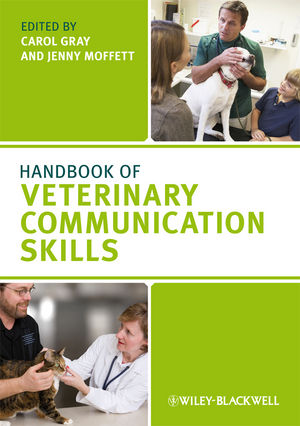Handbook of Veterinary Communication SkillsISBN: 978-1-4051-5817-6
Paperback
216 pages
March 2010, Wiley-Blackwell
 This is a Print-on-Demand title. It will be printed specifically to fill your order. Please allow an additional 10-15 days delivery time. The book is not returnable.
|
||||||
Foreword ix
Acknowledgements xi
Introduction xiii
Chapter 1 Basic communication skills 1
Mary Kirwan
Introduction 1
Background and origins 1
The importance of communication 2
Definition of key terms 3
Models of communication 4
Verbal and non-verbal communication 7
Listening 15
The cultural context of communication 21
Summary 22
References 22
Chapter 2 A framework for the veterinary consultation
25
Alan Radford
Introduction 25
A guide to the veterinary consultation based on the Calgary–Cambridge observation guide 27
The physical examination 37
Closing the consultation 37
Summary 38
References 38
Chapter 3 Professional, ethical and legal aspects of
communication 39
Carol Gray
Introduction 39
Communicating professionalism 39
Gathering information from clients 41
Giving information to clients 42
Informed consent 47
References 59
Chapter 4 Compassionate communication: working with grief
62
Susan Elizabeth Dawson
Introduction 62
The HCAB 63
Review of quality-of-life indicators 93
Setting up and running continuing care clinics 95
PET loss support groups 96
CPD opportunities 97
Resources and useful websites 97
References 98
Chapter 5 Dealing with difficult situations 100
Carol Gray and Jenny Moffett
Introduction 100
The use of veterinary communication skills at the end-of-life 100
A seven-step approach to communication at the end-of-life 102
Euthanasia – before, during and after 105
Welfare concerns 109
Informed clients 110
Communicating cost 112
Dealing with anger 115
Communication of mistakes 118
References 122
Chapter 6 Communicating with colleagues 127
Geoff Little
Introduction 127
The team and its leader 128
Induction schemes and mentoring 131
Appraisals 132
Exit interview 133
Delegation 134
Standard operating procedures 136
Staff suggestion scheme 139
Practice meetings 142
Reporting structure 144
Rotas 145
Interpractice communication 145
References 147
Chapter 7 Communicating with a wider audience 149
Jenny Moffett
Public speaking for beginners 149
Veterinary medicine and the media – a meeting of two worlds 155
References 166
Chapter 8 Communication and self-care in the veterinaryprofession 168
Communication, stress and the individual 168
Martina A. Kinsella
The first step to inner freedom 169
Moving from victim to victor 170
Implementing change 171
Learning assertiveness skills and becoming an assertive
individual 173
Beyond words: communication, social relationship and health
176
David Bartram
The disclosure phenomenon 177
Importance of social relationships 180
The role of telephone support helplines 183
Summary and conclusions 185
Acknowledgements 185
References (Communication, stress and the individual) 185
Further reading (Communication, stress and the individual) 186
References (Beyond words: communication, social relationships and health) 186
Index 190



